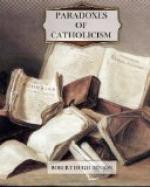THE FOURTH WORD
My God, My God, why hast Thou forsaken Me?
Our Blessed Lord in the revelation He makes from the Cross passes gradually inwards to Himself Who is its centre. He begins in the outermost circle of all, with the ignorant sinners. He next deals with the one sinner who ceased to be ignorant, and next with those who were always nearest to Himself, and now at last He reveals the deepest secret of all. This is the central Word of the Seven in every sense. There is no need to draw attention to the Paradox it expresses.
I. First, then, let us remind ourselves of the revealed dogma that Jesus Christ was the Eternal Son of the Father; that He dwelt always in the Bosom of that Father; that when He left heaven He did not leave the Father’s side; that at Bethlehem and Nazareth and Galilee and Jerusalem and Gethsemane and Calvary He was always the Word that was with God and the Word that was God. Next, that the eyes even of His Sacred Humanity looked always and continuously upon the Face of God, since His union with God was entire and complete: as He looked up into His Mother’s face from the manger, He saw behind it the Face of His Father; as He cried in Gethsemane, If it be possible, even in His Sacred Humanity He knew that it could not be; as He groaned out on Calvary that God had forsaken Him, He yet looked without one instant’s intermission into the glory of heaven and saw His Father there.
Yet simultaneously with these truths it is also true that His cry of dereliction was incalculably more of a reality than when first uttered by David or, since, by any desolate sinner in the thickest spiritual darkness. All the miseries of holy and sinful souls, heaped together, could not approach even afar off the intolerable misery of Christ. For of His own will He refused to be consoled at all by that Presence which He could never lack, and of His own will He chose to be pierced and saturated and tormented by the sorrow He could never deserve. He held firm against the touch of consolation every power of His Divine and Human Being and, simultaneously, flung them open to the assaults of every pain. And if the psychology of this state is altogether beyond our power to understand, we may remind ourselves that it is the psychology of the Word made Flesh that is confronting us.... Do we expect to understand that?...
II. There is a human phrase, however, itself a paradox, yet corresponding to something which we know to be true, which throws some faint glimmer of light upon this impenetrable darkness and seems to extend Christ’s experience upon the Cross so as to touch our own human life. It is a phrase that describes a condition well known to spiritual persons: “To leave God for God.” (1) The simplest and lowest form of this state is that condition in which we acquiesce with our will in the withdrawal of ordinary spiritual consolation.




